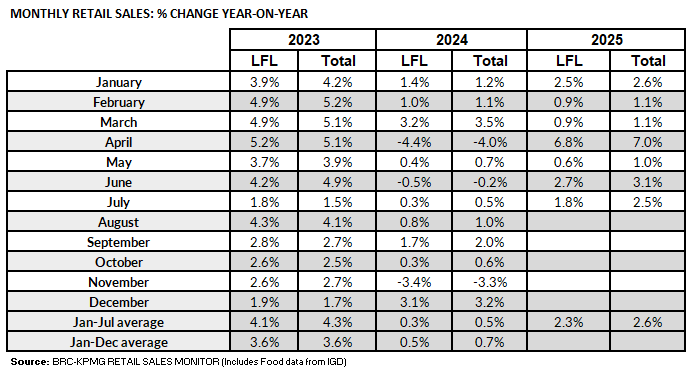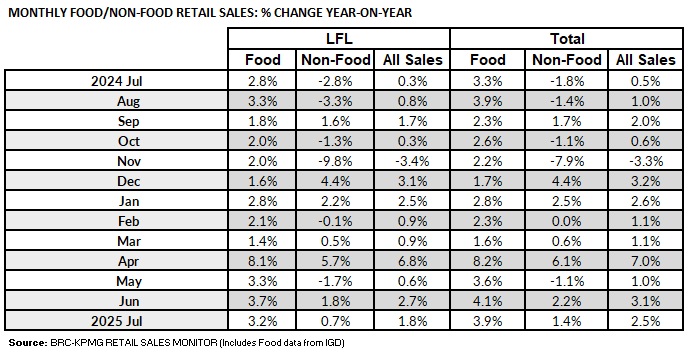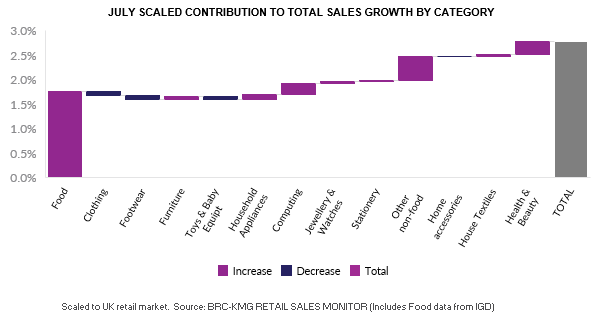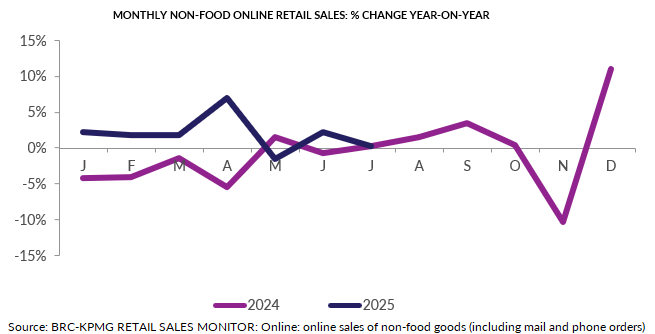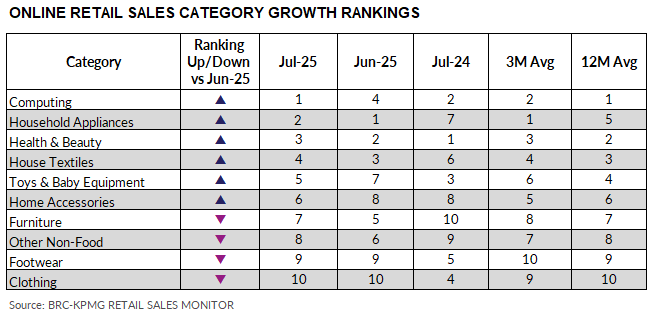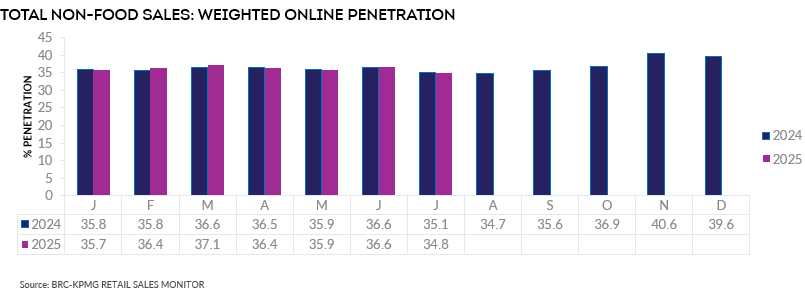BRC-KPMG RETAIL SALES MONITOR – JULY
2025
Covering the four weeks 06 July to 02 August 2025
-
UK Total retail sales increased by 2.5%
year on year in July, against a growth of 0.5% in July 2024.
This was above the 12-month average growth of 1.9%.
-
Food sales increased by 3.9% year on year
in July, against a growth of 3.3% in July 2024. This was
above the 12-month average growth of 3.2%.
-
Non-Food sales increased by 1.4% year on
year in July, against a decline of 1.8% in July 2024. This was
above the 12-month average growth of 0.8%.
-
In-Store Non-Food sales increased by 1.9%
year on year in July, against a decline of 3% in July 2024.
This was above the 12-month average growth of 0.2%.
-
Online Non-Food sales increased by 0.3%
year on year in July, against a growth of 0.3% in July 2024.
This was below the 12-month average growth of 1.9%.
-
The online penetration rate (the
proportion of Non-Food items bought online) decreased to 34.8%
in July from 35.1% in July 2024. This was below the 12-month
average of 36.7%.
Helen Dickinson, Chief Executive of the British Retail
Consortium, said:
“Food sales did well in early July thanks to warm weather and a
packed sporting schedule, though this momentum failed to hold for
the rest of the month. Rising food inflation meant increased
spending was more a result of higher prices than improved demand.
Fashion sold well early in the month, but deteriorated as weather
worsened, while homeware and indoor furniture grew steadily,
recovering from the previous year's decline. Gaming and toys sold
particularly well, as nostalgic adults purchased products like
Lego.
“With sales growth at these levels, it is barely touching the
sides of covering the £7bn new costs imposed on retailers at the
last Budget. If the upcoming Autumn Budget sees more taxes levied
on retailers' shoulders many will be forced to make difficult
choices about the future of shops and jobs, and ongoing pressure
would push prices higher. Ultimately, this means more families
struggling, particularly those on lower incomes, reduced consumer
spending and a drag on economic growth.”
Linda Ellett, UK Head of Consumer, Retail & Leisure,
KPMG, said:
“The UK's fifth warmest July on Met Office record brought a boost
to home appliance and food and drink sales. But rising
inflation was also a driver of the latter and monthly non-food
sales are only growing at around 1% on average at present.
With employment costs having risen and inflation both a business
and consumer side pressure, it remains a challenging trading
environment for many retailers.
“While the majority of consumers that KPMG surveys are confident
in their ability to balance their monthly household budgets, big
ticket purchases are more considered in the context of rising
essential costs and ongoing caution about the economy and labour
market. Holidays are the priority for many this summer but
those heading away have had to account for a higher cost of
travel. Consequently, spending in some areas of the retail
sector remains subdued and competition for consumer spend will
remain fierce.”
Food & Drink sector performance | Sarah Bradbury,
CEO, IGD, said:
“July's shopper confidence fell to zero for the first time since
April, cooling alongside the weather despite boosts from
Wimbledon and the Lionesses' win. More households are feeling the
pinch yet trust in the industry rose by three points. With food
price inflation climbing to 4.5% and economic uncertainty
growing, shoppers face a tough outlook. Own label products
continue to outperform brands, but modest volume growth shows
inflation is masking any gains. A potential interest rate cut,
and a sunny bank holiday could offer a much-needed boost at the
end of the summer.”
